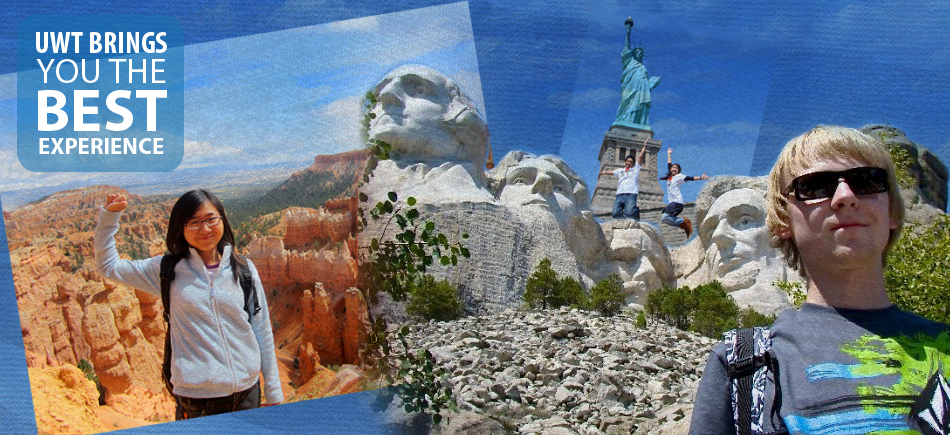Visa students fill the gaps in ND oil patch while experiencing America

Dan’s Super Valu manager Joe Fridrich talks with Supeera “Champ” Boonngam, of Thailand, during one of his first days at work last week.
Bismark Tribune: April 15, 2012
DICKINSON, N.D. — A young man nicknamed “Big” wears his baseball cap backward, American style, and a black apron to wash dishes at the Applebee’s in Dickinson.
His real name is Supachai Wiphaphunsakul and he’s from Thailand.
He’s been in Dickinson for less than a week. He’s up to his elbows in suds and up to his neck absorbing English and learning his way around a new town and new culture.
He’s among what many of the community’s business managers refer to as J-1’ers — students from all over the world who apply for a J-1 visa in order to come to the United States for three months of work and one month of travel.
It’s a good fit. Oil patch communities like Dickinson, Williston and Minot desperately need these minimum-wage-level workers and the young people need a way to expand their horizons.
Wiphaphunsakul is here with the Maryland-based United Work and Travel program. Its employer operations director, Suzann Cushman, said there are about 100 J-1 students in Dickinson, an equal number in Williston and slightly more in Minot.
Annually, her company places about 1,000 students in those three cities to work service jobs in the fast food, retail and hospitality industries that go begging because so many who would normally take them have wandered off to work in the oil industry.
Cushman said that besides the need for these workers, North Dakota has so much to offer.
“North Dakota is just what I would design for this program. These kids are embraced by the community. There’s a cultural sharing and when it’s over, they’ve made a friend for life,” she said.
She talked about a long line at a checkout station and instead of there being a problem at the till, it turned out people queued there especially to enjoy that international worker’s friendly, personal greeting. On another occasion, during last year’s three-day blackout in Williston, a group of Asian students prepared hot noodle dishes out in the parking lot for the hotel guests. Others hauled sandbags in Minot.
“North Dakota has become our new favorite place. Hopefully, all these interactions will make the world a better place as these young people return home to become leaders in their communities,” Cushman said.
Wiphaphunsakul , 23, emerged from the kitchen at Applebee’s with soft, clean hands and a wide smile on his face.
He could have picked other destinations, including Hawaii, but that was too much like home, he said.
“This place is near Canada and I wanted to try a new climate, just for the experience,” he said. “Thailand never has the cool (temperatures) like this.”
His situation has been several kinds of cool.
His employer, Applebee’s manager Pam Schmaltz, said Wiphaphunsakul is among the second group of J-1’ers who have worked at the restaurant starting this year.
The first group came from Brazil; the one after this will come from Macedonia and Romania.
The extra help has made life easier and more flexible for an overworked staff trying to keep up in the fast-paced oil patch.
But it’s more than that.
“They’re amazing individuals. They’re here to work and they’re some of the most respectful kids I have ever met. With the Brazilian kids that were here, my staff just adored them. They’ve made lifelong friends,” she said.
At Applebee’s, the young people are hostesses, dishwashers and food prep help, she said.
At the Quality Inn, across Interstate 94 in Dickinson, manager Sharon Dvorak said she was open to trying the first batch of J-1 students, also from Brazil, but she didn’t quite know what to expect.
When their three months were up a few weeks ago, it was all she could do to keep from crying when she said goodbye.
“What a wonderful job they did. The customers enjoyed them, too,” she said.
Just last week, two new workers arrived at the Quality Inn, young women from Thailand who are helping at the breakfast bar and the laundry.
Noppakun Tiwapat, 20, and Arissara Sematut, 20, said they wanted to learn English and make friends.
“My mother wants me to learn more English. It’s important in the world. When I finish the university, it will be important,” Tiwapat said.
The J-1 program is a work visa for students and Cushman said the students may earn some university credits in their home country, but they’re not part of any school system in the United States.
She said the students tend to come from one or several countries at certain times of the year, depending on that country’s university schedules. It’s the reason why so many current placements are from Thailand.
Cushman’s agency does a background check on the applicants and all of them have to have at least one year of university study and a “B” average to qualify.
The students have to demonstrate some English proficiency and employers can choose a proficiency level to fit their comfort level.
Cushman said she encourages the students to be ambassadors of their own country.
“I tell them, if they’re from Macedonia, everyone they work with should be able to find that country on a map before they leave,” she said.
Dan’s Supermarket in Dickinson has 12 J-1’ers, all of them from Thailand.
They’ve only been in the store for a few days, but retail manager Joe Fridrich said he’s already impressed.
“They all have good attitudes, jovial,” he said.
He said he needs a few more hands everywhere in the store, so the students are a big help. Ideally, to cover a 24-hour schedule, he needs 200 people on the roster. “I have trouble getting enough employees,” he said.
He can put the J-1’ers to work stocking shelves, helping in the deli and bakery, prepping produce, checking carts and cleaning.
“It’s been a very positive experience. Among the employees, they’re getting to know one another. They’ve been cordial, well-mannered, respectful,” he said.
Bismark Tribune: April 15, 2012
He said the store’s customers — far from being frustrated with the students’ language limitations — display curiosity and interest in the students’ well-being.
“They’re definitely filling in the gap for us,” Fridrich said.
Andrea Koppang, of Food Management Investor of Minot, provides human resource support for Applebee’s and other restaurants in the oil patch.
She said she has placed 50 J-1 students and could use another 50.
“These are positions we would be struggling to fill. Our restaurants welcome them with open arms and appreciate each and every one of these kids,” she said. “They bring so much cultural diversity and they end up with lifelong relationships.”
The students pay $5,000 for the placement and travel expense through the agency and while here, they can work plenty of hours and make decent money.
After students’ work visas expire, they get one month to look around America before hopping on a plane to head back home.
To a young man — and a young woman — each of them said they would spend that last month in the bright lights of one of America’s great cities and indulge in one of this country’s favorite pastimes — shopping.
Shopping for what? Sematut had all those words in her vocabulary: “Shoes, handbags, perfume.”
Cushman said the only difficulty has been finding housing for the young people. She said anyone who would like to share their home with a J-1 student should visit the agency’s website atwww.unitedworkandtravel.com.




